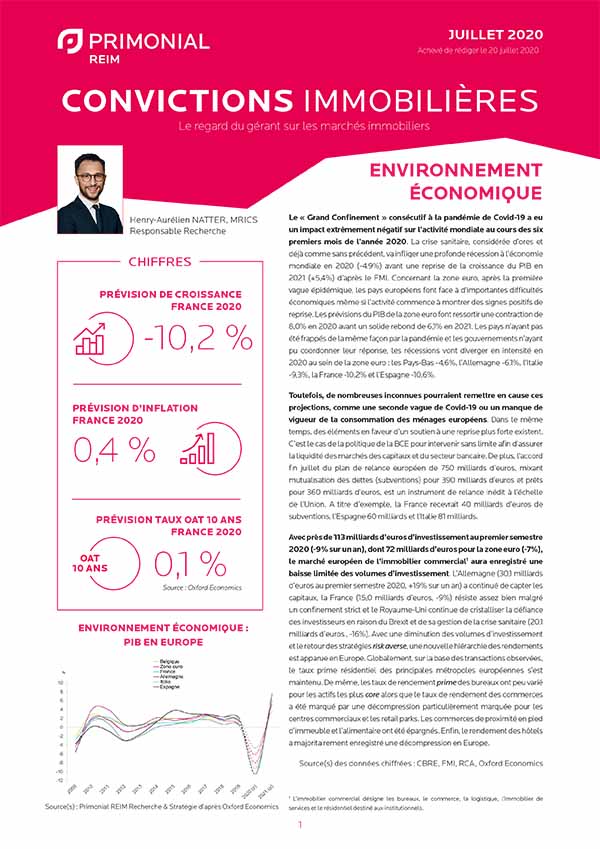- Home
- Studies and research
- Real estate convictions : France - 1st semester 2020
Real Estate Convictions
The “Great Lockdown” following the Covid-19 pandemic had an extremely negative impact on global activity during the first six months of 2020. The health crisis, which is already considered to be unprecedented, will inflict a deep recession on the world economy in 2020 (-4.9%) before GDP growth ticks up again in 2021 (+5.4%), according to the IMF. In the eurozone, Europe is facing major economic difficulties after the first wave of the epidemic, although activity is starting to show positive signs of a recovery. GDP forecasts for the eurozone point to a 8.0% contraction in 2020 before a strong 6.1% rebound in 2021. As the various countries have not been affected in the same way by the pandemic and governments were unable to coordinate their responses, the recessions will differ in their intensity in 2020 within the eurozone, with the Netherlands at -4.6%, Germany at -6.1%, Italy at -9.3%, France at -10.2% and Spain at -10.6%.
Many unknown factors could challenge these projections, however, such as a second wave of Covid-19 or sluggish household consumption in Europe. At the same time, there are also factors supporting a stronger recovery. One of these is the ECB’s policy of unlimited intervention to ensure the liquidity of the capital markets and the banking sector. The agreement reached on the €750 billion European stimulus plan, which combines the pooling of €390 billion of debt (subsidies) with €360 billion of loans, is an EU-wide stimulus instrument the like of which has never been seen before. It includes subsidies of €40 billion for France, €60 billion for Spain and €81 billion for Italy.
With nearly €113 billion of investment in the first half of 2020 (-9% year on year), of which €72 billion for the eurozone (-7%), the European commercial1 real estate market has seen only a limited fall in investment volumes. Germany (€30.1 billion in the first half of 2020, up 19% year on year) has continued to capture capital, France (€15.0 billion, down 9%) is holding up well despite a strict lockdown, and the UK is continuing to be the focus of investors’ mistrust due to Brexit and its management of the health crisis (€20.1 billion , down 16%). With a reduction in investment volumes and the return of risk averse strategies, a new hierarchy of yields has emerged in Europe. Overall, based on the transactions observed, the prime residential yield for the major European cities has held steady. Likewise, the prime office yields for the most core assets have changed little, whereas the retail outlet yield has risen particularly steeply for shopping centres and retail parks. High street shops and grocery shops have been spared. Finally, the hotel yield has mostly risen in Europe.
Henry-Aurélien Natter, Research Manager, analyse the french real estate market for the first semester 2020.
Source(s) for figures: CBRE, FMI, RCA and Oxford Economics
1 Commercial real estate refers to offices, retail outlets, logistics, services and residential assets aimed at institutional clients.

The team

Henry-Aurélien Natter joined Praemia REIM as Research Manager in January 2018. He has the mission of developing the analyses of the Research & Strategy Department on the real estate markets, the economy and capital in France and in Europe.
Henry-Aurélien Natter began his career at Les Echos Etudes (formerly Eurostaf), then at C&W (formerly DTZ), and lastly at BNP PRE, where he acquired solid and varied experience in real estate research, strategy and finance. He is qualified with an AES degree in Business Management, a Masters Decree in management and SME management, and an International Master in commerce and marketing.
You may also like

- Market review
Real Estate Convictions : Q4 2024
The continued reduction in ECB interest rates, the level of savings amongst Europeans and the recovery of the real estate markets between 2022 and 2024 all point to the potential for improvement and a rebound in the sector.

- Market review
Real Estate Convictions : Q3 2024
In October 2024, the ECB announced its third consecutive rate cut to ease its restrictive monetary policy, and we believe that a new momentum has opened up for the European real estate market. Indeed, this quarter we have seen a thaw in certain real estate indicators.

- Market review
Real estate outlook: October 2024
Over the last four years, we have been through a series of repeated crises. The unprecedented market context has reshuffled the cards between asset classes, and alternative real estate has emerged on the back of favourable fundamentals.


 et Firefox
et Firefox 